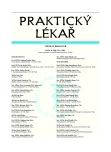-
Medical journals
- Career
Has the time come for more personalised medicine in psychiatry?
Authors: C. Höschl
Authors‘ workplace: Ředitel: prof. MUDr. Cyril Höschl, DrSc., FRCPsych. ; Psychiatrické centrum, Praha
Published in: Prakt. Lék. 2010; 90(8): 502-505
Category: Topic/News/Review
Overview
In psychiatry, personalised medicine in terms of treatment tailored to the individual patient can currently only be based on the knowledge of the mode of action of psychotropic drugs, their pharmacokinetics, and on predictive tests, e.g., QEEG methods. The use of molecular biology, genomics, and proteomics in psychiatry still lags behind other medical fields.
Key words:
personalised medicine, psychiatry, psychopharmacology.
Sources
1. Höschl, C. First-generation antipsychotics. In: Stolerman I.P. (ed.), Encyclopaedia of Psychopharmacology. Berlin-Heidelberg: Springer-Verlag, 2010.
2. Burns, M.J. The pharmacology and toxicology of atypical antipsychotic agents. J. Toxicol. Clin. Toxicol. 2001, 39(1), p. 1-14.
3. Horáček, J. a kol. Psychotické stavy v klinické praxi. Praha: Amepra, 2003.
4. Weiden, P.J. Switching antipsychotics as a treatment strategy for antipsychotic-induced weight gain and dyslipidemia. J. Clin. Psychiatry 2007, 68, Suppl 4, p. 34-39.
5. Bareš, M., Brunovský, M., Kopeček, M et al. Changes in QEEG prefrontal cordance as a predictor of response to antidepressants in patients with treatment resistant depressive disorder: A pilot study. J. Psych. Res. 2007, 41(3-4), p. 319-325.
Labels
General practitioner for children and adolescents General practitioner for adults
Article was published inGeneral Practitioner

2010 Issue 8-
All articles in this issue
- Human biomonitoring – its importance and application for evaluating population exposure to environmental chemicals (toxins)
- Arrhythmias in patients with metabolic syndrome and critical limb ischemia
- Relapse prevention treatment of addictive diseases
- Spontaneous intracranial hypotension
- Pancreatic cancer: Molecular biology and early detection
- Has the time come for more personalised medicine in psychiatry?
-
Evolution and evolutionary theory for physicians.
VIII. Evolution of the human brain - Zinc and its relation to prostate tumours
-
How can be quality of care successfully measured:
an example of good practice from Denmark - Family caregivers of patients with dementia
- Physical activity as a part of cardiovascular disease prevention in the general practitioner’s surgery
- Occurrence of symptoms and risk factors for obstructive sleep apnea in patients examined for cardiac arrhythmias through Holter ECG monitoring
- General Practitioner
- Journal archive
- Current issue
- Online only
- About the journal
Most read in this issue- Spontaneous intracranial hypotension
- Zinc and its relation to prostate tumours
- Human biomonitoring – its importance and application for evaluating population exposure to environmental chemicals (toxins)
- Physical activity as a part of cardiovascular disease prevention in the general practitioner’s surgery
Login#ADS_BOTTOM_SCRIPTS#Forgotten passwordEnter the email address that you registered with. We will send you instructions on how to set a new password.
- Career

